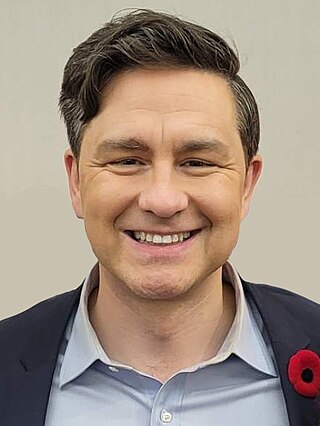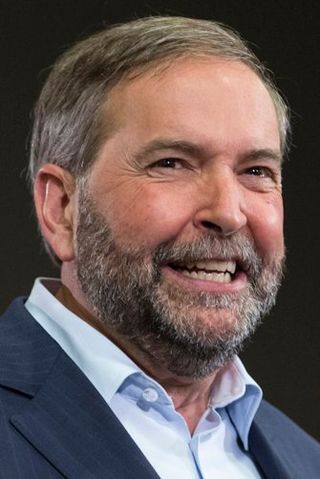The shadow cabinet or shadow ministry is a feature of the Westminster system of government. It consists of a senior group of opposition spokespeople who, under the leadership of the Leader of the Opposition, form an alternative cabinet to that of the government, and whose members shadow or mirror the positions of each individual member of the Cabinet. Their areas of responsibility, in parallel with the ruling party's ministries, may be referred to as a shadow portfolio. Members of a shadow cabinet have no executive power. It is the shadow cabinet's responsibility to scrutinise the policies and actions of the government, as well as to offer alternative policies. The shadow cabinet makes up the majority of the Official Opposition frontbench, as part of frontbenchers to the parliament. Smaller opposition parties in Britain and Ireland have Frontbench Teams.
Parliamentary opposition is a form of political opposition to a designated government, particularly in a Westminster-based parliamentary system. This article uses the term government as it is used in Parliamentary systems, i.e. meaning the administration or the cabinet rather than the state. In some countries, the title of "Official Opposition" is conferred upon the largest political party sitting in opposition in the legislature, with said party's leader being accorded the title "Leader of the Opposition".

The leader of the Official Opposition, formally known as the leader of His Majesty's Loyal Opposition, is the politician who leads the Official Opposition in Canada, typically the leader of the party possessing the most seats in the House of Commons that is not the governing party or part of the governing coalition.
In Canada, each political party with representation in the House of Commons has a House leader who is a front bench member of Parliament (MP) and an expert in parliamentary procedure. The same representation is found in the provincial and territorial legislatures. The House leader is in charge of the party's day-to-day business in the House of Commons of Canada, and usually conducts negotiations with other parties on the conduct of bills and debates.

His Majesty's Loyal Opposition, or simply the Official Opposition, is usually the second-largest party in the House of Commons. Typically, it is the largest party of the parliamentary opposition, which is composed of members of Parliament (MPs) who are not in government.
In many parliaments and other similar assemblies, seating is typically arranged in banks or rows, with each political party or caucus grouped together. The spokespeople for each group will often sit at the front of their group, and are then known as being on the frontbench and are described as frontbenchers. Those sitting behind them are known as backbenchers. Independent and minority parties sit to the side or on benches between the two sides, and are referred to as crossbenchers. Frontbenchers may be part of a Frontbench Team with other members of their political party.
The Official Opposition Shadow Cabinet, or His Majesty’s Most Loyal Opposition Shadow Cabinet, but usually simply the Shadow Cabinet, is the committee of senior members of the Official Opposition who scrutinise the work of the Cabinet of the United Kingdom. Each Shadow Cabinet member is typically given a position which corresponds to that of a government minister in Cabinet.
The Official Opposition Shadow Cabinet of the 39th Canadian parliament is listed below. Members are drawn from the Liberal Party of Canada, and most are members of their parliamentary caucus. The shadow cabinet was most recently shuffled on March 31, 2008.
The Liberal Democrats are a political party in the United Kingdom. While in opposition, the Leader of the Liberal Democrats appoints a frontbench team of members of Parliament (MPs), peers in the House of Lords, members of the Scottish Parliament (MSPs), and members of the Senedd (MSs) to speak for the party on different issues. Their areas of responsibility broadly corresponded to those of Government ministers. The frontbench team is divided into departmental sub-units, the principal ones being the economy, foreign policy, and home affairs. Sometimes the frontbench team consists of more than just the principal positions.

The Official Opposition in New Zealand is usually the largest political party or coalition which is not a member of the ruling government—it does not provide ministers. This is usually the second-largest party in the House of Representatives, although in certain unusual circumstances it may be the largest party or even a third or fourth party.

The shadow secretary of state for Northern Ireland is a member of the British Shadow Cabinet responsible for the scrutiny of the secretary of state for Northern Ireland and their department, the Northern Ireland Office. The post was held by Hilary Benn.
The Official Opposition Shadow Cabinet of the 40th Canadian parliament is listed below. Members are drawn from the Liberal Party of Canada. Michael Ignatieff announced a new line-up of Liberal critics on 7 September 2010.

The 40th Canadian Parliament was in session from November 18, 2008 to March 26, 2011. It was the last Parliament of the longest-running minority government in Canadian history that began with the previous Parliament. The membership of its House of Commons was determined by the results of the 2008 federal election held on October 14, 2008. Its first session was then prorogued by the Governor General on December 4, 2008, at the request of Prime Minister Stephen Harper, who was facing a likely no-confidence motion and a coalition agreement between the Liberal party and the New Democratic Party with the support of the Bloc Québécois. Of the 308 MPs elected at the October 14, 2008 general election, 64 were new to Parliament and three sat in Parliaments previous to the 39th: John Duncan, Jack Harris and Roger Pomerleau.
This is a list of members of the New Democratic Party Shadow Cabinet of the 39th Canadian parliament. Positions in the shadow cabinet were announced on September 27, 2007, and includes all 30 members of the New Democratic Party caucus in the House of Commons of Canada.
Elections to the Labour Party's Shadow Cabinet took place in July 1992. Shadow Cabinet elections generally take place at the beginning of a parliamentary session, but the 1992 vote was postponed until a new leader was elected to replace Neil Kinnock. Under the rules then in effect, the Commons members of the Parliamentary Labour Party elected 18 members of the Official Opposition Shadow Cabinet, who were then assigned portfolios by the leader. The Commons members of the PLP separately elected the Chief Whip, and the Labour peers elected the Leader of the Opposition in the House of Lords. In addition, the Leader of the Labour Party and Deputy Leader were members by virtue of those offices. The 18 elected members of the Shadow Cabinet were the ones with the largest number of votes, except that the three women with the most votes would be included in the 18, even if they were not among the top 18 based on the number of votes.

The Official Opposition Shadow Cabinet in Canada is composed of members of the main Opposition party responsible for holding the Government to account and for developing and disseminating the party's policy positions. Members of the Official Opposition are generally referred to as Opposition Critics, but the term Shadow Minister is also used.
The Official Opposition Shadow Cabinet in Canada is composed of members of the main opposition party, His Majesty's Loyal Opposition, and is responsible for holding the Government to account and for developing and disseminating the party's policy positions. Members of the official opposition are generally referred to as opposition critics, but the term Shadow Minister is also used.

The Official Opposition Shadow Cabinet in Canada is composed of Members of Parliament of the main Opposition party responsible for holding the Government to account and for developing and disseminating the party's policy positions. Members of the Official Opposition are generally referred to as Opposition Critics, but the term Shadow Minister is also used. The Conservative Party of Canada served as the Official Opposition in the 42nd Parliament.
This is a list of members of the New Democratic Party Shadow Cabinet of the 42nd Canadian Parliament. Positions in the shadow cabinet were announced on November 12, 2015, and included all 44 members of the New Democratic Party caucus in the Canadian House of Commons.

Stephanie L. Kusie is a Canadian politician and former diplomat who was elected to the House of Commons of Canada in a by-election on April 3, 2017. She represents the electoral district of Calgary Midnapore in Alberta as a member of the Conservative Party of Canada and serves as Shadow Minister of Treasury Board in the Official Opposition Shadow Cabinet of the 44th Parliament of Canada.








